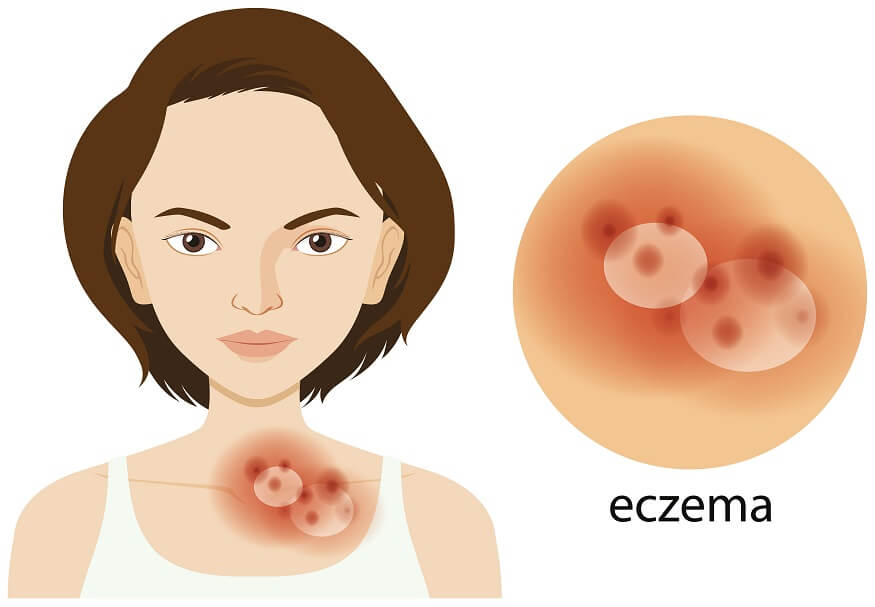Eczema, also known as dermatitis, is a common skin inflammation condition characterised by itchy, red, dry, and swollen skin. It is a chronic, relapsing disease and is commonly associated with other allergic conditions like asthma and hay fever. Although it can strike at any age, eczema is seen most often in infants and children. In this blog, we will delve into the causes, symptoms, diagnosis, and treatment options for eczema.
Eczema Causes
The exact cause of eczema is unclear, but it is believed to involve an interplay of genetic and environmental factors. Certain genes may make one prone to developing the disease, a trait often passed down through families. The environment may then act as a trigger in susceptible individuals, leading to inflammation in the skin.
Potential triggers include irritants like soaps, detergents, and allergens such as dust mites or pet dander. Further, factors such as a disrupted skin barrier, which allows for moisture loss and facilitates the entry of infectious or irritant agents, play a significant role.
Stress and hormonal changes can also exacerbate eczema. However, eczema is not a contagious disease.
Also Read: Effective Tips to Treat Mosquito Bites in Toddlers
Eczema Symptoms
The main symptoms of eczema are:
1) Itchy skin: Intense itching is a sign of eczema, and it can be so severe that it causes sleep disturbance and affects daily activities. Itchy skin can lead to scratching, which can exacerbate the condition and cause the skin to break down, making it more susceptible to infections.
2) Redness and Inflammation: Affected skin may become red, swollen, and inflamed, especially during flare-ups.
3) Dry and Flaky Skin: Eczema can cause the skin to become dry, scaly, and rough, leading to further itching and discomfort.
4) Blisters and Oozing: In severe cases, eczema can cause the formation of blisters that ooze and crust over.
5) Thickness and Discoloration: With chronic eczema, the affected skin may become thickened and discoloured over time.
Eczema Diagnosis
Eczema can be sufficiently diagnosed by a healthcare provider through a visual examination and a review of the patient’s medical history. Topical and blood allergy tests may also be used to identify potential triggers or co-existing conditions. As there is no definitive test to diagnose eczema, doctors primarily rely on the patient’s symptoms and history for an accurate diagnosis.
Also Read: How to find the Right Water Temperature for Baby Bath: Tips, Tricks, and Safety Measures
Eczema Treatment
Although there is as yet no cure for this chronic skin condition, treatments and self-care measures can relieve itching and prevent new outbreaks. A primary treatment approach includes liberally applying non-prescription creams and ointments that promote healing and maintain skin moisture. Prescription creams or ointments containing corticosteroids or calcineurin inhibitors can also reduce inflammation and control flare-ups.
If the skin becomes infected, your doctor may prescribe antibiotics. In severe cases or if large areas of skin are affected, oral corticosteroids may be used. However, consistent monitoring is required due to potential side effects. Some ways to manage eczema include:
1) Moisturizers: Regularly applying moisturiser helps keep the skin hydrated and prevents dryness and itching.
2) Topical Steroids: They help reduce inflammation and relieve itching during flare-ups.
3) Antihistamines: Oral antihistamines can help reduce itching and aid in better sleep.
4) Topical Immunomodulators: These medications suppress the immune response and are used by doctors for long-term management of eczema.
5) Avoiding Triggers: Identifying and staying away from triggers, such as certain fabrics, soaps, or allergens, prevent flare-ups.
6) Wet Dressings: Bandages soaked in medicated solutions may be applied to affected areas to ease symptoms.
7) Phototherapy: Under medical supervision, controlled exposure to ultraviolet light can help reduce inflammation and itching.
Besides pharmaceutical interventions, lifestyle changes play an important role in managing eczema. Regular exercise promotes better circulation, which aids skin health. However, excessive sweating could potentially trigger eczema flare-ups, hence, it’s vital to shower immediately after exercising.
A balanced diet that includes anti-inflammatory foods like fatty fish and probiotic-rich foods may also help reduce symptoms. Lastly, stress management techniques, such as meditation, yoga, and other forms of relaxation, may help reduce eczema flare-ups, as stress has been linked to worsening eczema symptoms. Living with eczema can be emotionally taxing, as the constant itchiness and discomfort can lead to frustration and anxiety. Individuals with eczema need to focus on self-care techniques to improve their overall well-being.
In the realm of alternative treatments, certain natural remedies and supplements have shown promise in managing eczema. For instance, evening primrose oil has been found to reduce itching and inflammation, and probiotics may improve the immune response in people with eczema. However, these should be used under the healthcare provider’s guidance only, and always in addition to, not as a replacement for, traditional treatments.
Also Read: Common Skin Infections In Children: Symptoms and Treatment
Conclusion
Eczema is a common dermatological condition that, despite not being curable, can be effectively managed with a combination of medical treatments and lifestyle modifications.
Those dealing with eczema need to understand the nature of the disease and monitor their symptoms to control outbreaks. With the right knowledge, treatment, and emotional support, those affected by eczema can lead fulfilling lives and effectively manage their condition.
Engaging in relaxation techniques such as meditation, yoga, or deep breathing exercises can also help reduce stress levels and promote a more positive outlook. Additionally, seeking support from family, and friends, or joining online communities dedicated to eczema can provide a sense of community and understanding, making the journey of managing eczema a little less daunting.
As advancements in research continue, there is hope that more effective treatments—and possibly a cure—for eczema are on the horizon.










